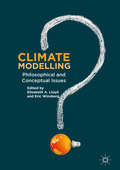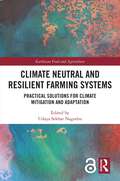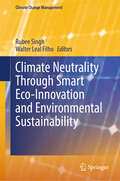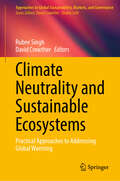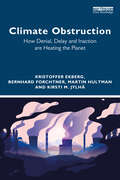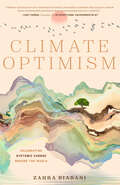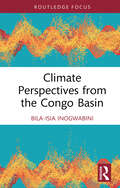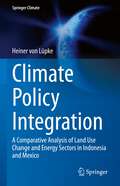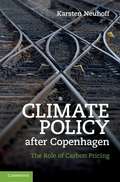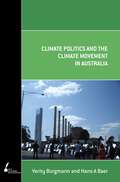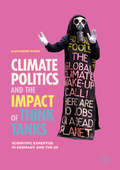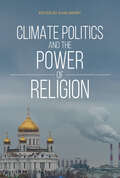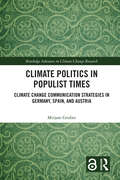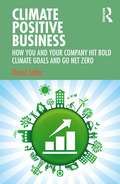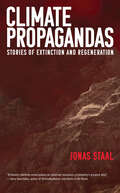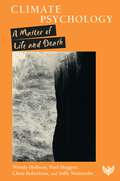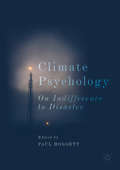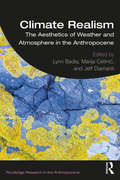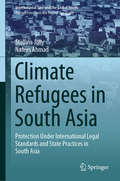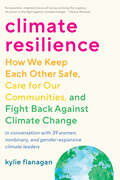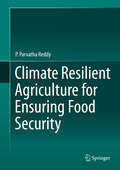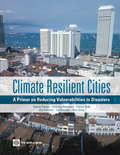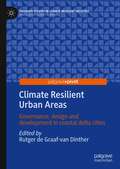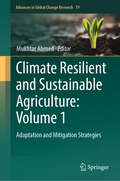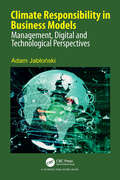- Table View
- List View
Climate Modelling
by Elisabeth A. Lloyd Eric WinsbergThis edited collection of works by leading climate scientists and philosophers introduces readers to issues in the foundations, evaluation, confirmation, and application of climate models. It engages with important topics directly affecting public policy, including the role of doubt, the use of satellite data, and the robustness of models. Climate Modelling provides an early and significant contribution to the burgeoning Philosophy of Climate Science field that will help to shape our understanding of these topics in both philosophy and the wider scientific context. It offers insight into the reasons we should believe what climate models say about the world but addresses the issues that inform how reliable and well-confirmed these models are. This book will be of interest to students of climate science, philosophy of science, and of particular relevance to policy makers who depend on the models that forecast future states of the climate and ocean in order to make public policy decisions.
Climate Neutral and Resilient Farming Systems: Practical Solutions for Climate Mitigation and Adaptation (Earthscan Food and Agriculture)
by Udaya Sekhar NagothuThis book presents evidence-based research on climate-neutral and resilient farming systems and further to provide innovative and practical solutions for reducing greenhouse gas emissions and mitigating the impact of climate change. Intensive farming systems are a significant source of greenhouse gas emissions, thereby contributing to global warming and the acceleration of climate change. As paddy rice farming is one of the largest contributors, and most environmentally damaging farming systems, this will be a particular focus of the book. The mitigation of greenhouse gas emissions needs to be urgently addressed to achieve the 2 degrees Celsius target adopted by COP21 and the 2015 Paris Agreement, but this is not possible if local and national level innovations are not accompanied by international level cooperation, mutual learning and sharing of knowledge and technologies. This book, therefore, brings together international collaborative research on climate-neutral and resilient farming systems compiled by leading scientists and experts from Europe, Asia and Africa. The chapters present evidence-based research and innovative solutions that can be applied or upscaled in different farming systems and regions across the world. Chapters present models and technologies that can be used for practical implementation at the systemic level and advance state of the art knowledge on carbon neutral farming. Combining theory and practice, this interdisciplinary book provides guidance which can inform and increase cooperation between researchers from various countries on climate-neutral and resilient farming systems. Most importantly, the volume provides recommendations which can be put into practice by those working in the agricultural industry, especially in developing countries, where they are attempting to promote climate-neutral and resilient farming systems. The book will be of great interest to students and academics of sustainable agriculture, food security, climate mitigation and sustainable development, in addition to policymakers and practitioners working in these areas.
Climate Neutrality Through Smart Eco-Innovation and Environmental Sustainability (Climate Change Management)
by Walter Leal Filho Rubee SinghThis book discusses how the relationship between climate neutrality, smart eco-innovation, and environmental sustainability can be understood as well as possible with an emphasis on relevant matters and challenges of a sustainable environment. It describes a framework for implementing climate resilient sustainable development, adaptation, and mitigation actions to achieve climate neutrality and the development of smart eco-innovations from the perspective of social, economic, and environmental aspects. The issue of climate neutrality is a critical one, and there are serious concerns about it. It is of great importance to understand the mechanism of climate change movement and climate variability, which also requires monitoring from a regional perspective in order to understand and mitigate climate change. The growing threat of climate instability requires smart and resilient policies in order to deal with it. Several analytical and practical approaches are available to promote resilience and environmental sustainability in all areas, encompassing the latest trends, developments, and useful tools including those related to the environment, sustainability, and climate change in rural, urban, and hilly areas. As the population of the world has increased rapidly, there is a great need for a more comprehensive understanding of the relationship between climate neutrality, smart eco-innovation, and environmental sustainability in addition to an urgent need for an effective and constructive mechanism to protect human lives and properties against threats to their lives and property that are anticipated or expected. This book is of interest and use to academicians, researchers, scientists, environmentalists, land resource managers, climate change scientists, forest administrators, but it is also of use to academicians, researchers, scientists, and scientists. In addition, this book also serves as a valuable resource for researchers and students in agriculture, ecology, soil science, and environmental science. This is also going to prove to be a useful read for policymakers as well.
Climate Neutrality and Sustainable Ecosystems: Practical Approaches to Addressing Global Warming (Approaches to Global Sustainability, Markets, and Governance)
by David Crowther Rubee SinghThis book is an essential contribution to the growing discourse on climate change, sustainability, and global warming. It explores the complex challenges of climate change and provides actionable strategies for achieving climate neutrality, emphasizing the balance between economic growth and ecosystem preservation. Highlighting the critical role of government leadership and policy integration, the book explores how collaboration across stakeholders, i.e., governments, private sectors, civil society, and international organizations, can drive sustainable frameworks. It provides examples of forward-thinking policies and initiatives that have successfully reduced carbon emissions and promoted green technologies worldwide. A significant focus is placed on the interconnectedness of human activity and ecosystems, addressing the delicate balance of ocean health, migration patterns, and economic systems. The book also explores the unique challenges faced by developing nations, emphasizing the need for adaptive strategies to ensure food security, growth, and resilience to extreme weather events. With sector-specific insights, the book highlights how industries like energy, transport, and tourism can adopt sustainable practices, leveraging technology and human capital to transition to a low-carbon future. Additionally, it examines the role of climate finance in supporting this transition, showcasing tools like green bonds, carbon pricing, and international funds. Featuring real-world examples and case studies, the book offers a practical guide for policymakers, businesses, and practitioners, providing a roadmap for scalable and innovative climate solutions. It is a must-read for anyone dedicated to fostering a sustainable and climate-resilient future.
Climate Obstruction: How Denial, Delay and Inaction are Heating the Planet
by Bernhard Forchtner Martin Hultman Kristoffer Ekberg Kirsti M. JylhäIn Climate Obstruction: How Denial, Delay and Inaction are Heating the Planet, Kristoffer Ekberg, Bernhard Forchtner, Martin Hultman and Kirsti Jylhä bring together crucial insights from environmental history, sociology, media and communication studies and psychology to help us understand why we are failing to take necessary measures to avert the unfolding climate crisis. They do so by examining the variety of ways in which meaningful climate action has been obstructed. This ranges from denial of the scientific evidence for human-induced climate change and its policy consequences, to (seemingly sincere) acknowledgement of scientific evidence while nevertheless delaying meaningful climate action. The authors also consider all those actions by which often well-meaning individuals and collectives (unintendedly) hamper climate action. In doing so, this book maps out arguments and strategies that have been used to counter environmental protection and regulation since the 1960s by, first and foremost, corporations supported by conservative actors, but also far-right ones as well as ordinary citizens. This timely and accessible book provides tools and lessons to understand, identify and call out such arguments and strategies, and points to actions and systemic and cultural changes needed to avert or at least mitigate the climate crisis.
Climate Optimism: Celebrating Systemic Change Around the World
by Zahra BiabaniA Guide on Climate Optimism and Environmental Sustainability "If you want to be part of the solution, this book is for you.” ―Kip Pastor, founder and CEO of Pique Action#1 New Release in Sustainable Business Development and Environmental PolicyZahra Biabani, a climate activist focused on hope and action, wrote this book to help readers learn why we need to and how we can stay optimistic in the face of the climate crisis. People are doing good things for our planet all over the world…. it's time we highlight it!Change the way you think about the future. The fate of humanity can be daunting, but we don’t need to live in that space. First, we need to change our attitude in order to implement nature based solutions that help mitigate climate change. Good news: there are numerous encouraging environmental trends that will change the way you think about how we can protect the planet. Get to know Zahra Biabani, a climate activist, influencer, CEO, and writer. Zahra’s content focuses on climate hope, optimism, humor, and doing good things. After unexpectedly establishing a career as an online sustainability educator and influencer her junior year at Vanderbilt University, Zahra decided to jump head first into the waters of entrepreneurship and authorship. Climate Optimism is her way to spread hope in the world.Inside, you’ll find:A comprehensive review of the most promising climate solutions Practical advice to change the way you think and feel about climate changeTwo years worth of good news from the “Weekly Earth Wins” series Interviews with activists in the Global South working on projects that further environmental sustainability If you liked Not Too Late, Apocalypse Never, or Unsettled or books for activists centered on environmentalism like A Field Guide to Climate Anxiety, The Intersectional Environmentalist, or Sustainable Badass, you’ll love Climate Optimism.
Climate Perspectives from the Congo Basin (Routledge Focus on Environment and Sustainability)
by Bila-Isia InogwabiniThis book considers the global question of climate change from local perspectives in the context of Central Africa.Bila-Isia Inogwabini examines attempts made by the international community to respond to the global challenges posed by climate change in the Congo Basin and highlights that these attempts have so far produced limited results. Abject poverty and the lack of academic, technical, institutional and governance capacities have made it difficult for these solutions to take root in local conditions. Taking a novel perspective, Inogwabini argues that what is needed is not austerity in the use of natural resources but rather increased material affluence for these communities, which will enable individuals to create their own ways to survive through the tides of climate change. He considers factors including social inertia, climate skepticism and lack of political structure and presents a climate change action plan that is targeted at the local level in the Congo Basin.Overall, this volume will be of great interest to students and scholars of climate change, global development and African studies more broadly.
Climate Policy Integration: A Comparative Analysis of Land Use Change and Energy Sectors in Indonesia and Mexico (Springer Climate)
by Heiner von LüpkeThis book analyzes climate policy integration processes by investigating cause-effect relations in cases of integrating climate policy in energy and land-use sectors of Indonesia and Mexico, taking a novel comparative case study approach. The book identifies root causes for integration outside of the public administration, discussing decisive factors in the political economy of the energy and land-use sectors. Showing how policy windows may open for the successful integration of climate policies nevertheless, the book addresses the need to identify and properly use these windows to establish the administrative and institutional arrangements for effective climate policy implementation. This book offers two-fold insights for overcoming the challenges posed by climate policy integration: Firstly, it contributes to theory-building by amending theories of the policy process and by taking a wider perspective on the role of integration in the context of transformational change processes in emerging economies. Secondly, it sets forth a set of research-based practical policy recommendations on how to foster climate policy integration in the political decision-making processes as well as the public administration structures. Therefore, this book will appeal to scholars and researchers of public policy, public administration, political science, and environmental sciences, as well as policy-makers and practitioners interested in a better understanding of climate policy integration in energy and land-use sectors.
Climate Policy after Copenhagen
by Karsten NeuhoffAt the UN Climate Negotiations in Copenhagen, 117 heads of state concluded that low-carbon development is necessary in order to combat climate change. However, they also understood that transition to a low-carbon economy requires the implementation of a portfolio of policies and programs - a challenging endeavour for any nation. This book addresses the need for information about factors impacting climate policy implementation, using as a case study one effort that is at the heart of attempts to create a low-carbon future: the European Emission Trading Scheme. It explores problems surrounding the implementation of the ETS, including the role of vested interests, the impact of design details and opportunities to attract long-term investments. It also shows how international climate cooperation can be designed to support the domestic implementation of low-carbon policies. This timely analysis of carbon pricing contains important lessons for all those concerned with the development of post-Copenhagen climate policy.
Climate Politics and the Climate Movement in Australia
by Verity Burgmann Hans A BaerClimate change is the hottest topic of the twenty-first century and the climate movement a significant global social movement. This book examines the broad context of Australian climate politics and the place of the climate movement within it. Acting 'from above' are the most powerful forces; corporations and governments, both Labor and Coalition; with the media framing the issues. Climate movement actors 'in the middle' include the Australian Greens, major environmental and climate organisations, public intellectuals, think-tanks, academics and the union movement. Acting 'from below' are the numerous local climate action groups and various regional and national networks. This lowest level is the primary location of the climate movement: and grassroots mobilisation the source of its vitality. Burgmann and Baer's study offers a vision for an alternative Australia based upon the principles of social equity and environmental sustainability.
Climate Politics and the Impact of Think Tanks: Scientific Expertise In Germany And The Us
by Alexander RuserThis book provides an innovative theoretical and analytical framework for studying the role and impact of specialized research organizations and consultancies on decision making in climate politics. It includes advanced empirical analysis of the case of Germany, compared with the situation in the USA. The book improves the understanding of the role and impact of ‘scientific’ advice in coping with the challenge of anthropogenic climate change.
Climate Politics and the Power of Religion
by Ken Conca Andrew Thompson Ana Mariella Bacigalupo Kelly D. Alley J. Brent Crosson David T. Buckley Roger-Mark De Souza Neeraj VedwanHow does our faith affect how we think about and respond to climate change?Climate Politics and the Power of Religion is an edited collection that explores the diverse ways that religion shapes climate politics at the local, national, and international levels. Drawing on case studies from across the globe, it stands at the intersection of religious studies, environment policy, and global politics.From small island nations confronting sea-level rise and intensifying tropical storms to high-elevation communities in the Andes and Himalayas wrestling with accelerating glacial melt, there is tremendous variation in the ways that societies draw on religion to understand and contend with climate change. Climate Politics and the Power of Religion offers 10 timely case studies that demonstrate how different communities render climate change within their own moral vocabularies and how such moral claims find purchase in activism and public debates about climate policy. Whether it be Hindutva policymakers in India, curanderos in Peru, or working-class people's concerns about the transgressions of petroleum extraction in Trinidad—religion affects how they all are making sense of and responding to this escalating global catastrophe.
Climate Politics in Populist Times: Climate Change Communication Strategies in Germany, Spain, and Austria (Routledge Advances in Climate Change Research)
by Mirjam GruberThis book navigates the neglected territory where far-right populism intersects with climate change, presenting a nuanced examination that transcends traditional research boundaries.In recent decades, Europe has grappled with the surge of far-right and populist movements, fueling robust academic debates. Simultaneously, the global discourse on climate change has become increasingly pervasive in societal and political spheres. This book provides a comprehensive exploration of how populist far-right parties discuss climate change within their national contexts, focusing on Germany, Spain, and Austria. Using a meticulous methodology rooted in critical discourse studies, Mirjam Gruber examines the perspectives on climate change held by mainstream parties thereby defining the national policy field. Gruber then delves into the discourse about climate change of populist far-right parties, revealing a complex web of obstructionist arguments intricately tied to the national policy context. By analyzing a diverse array of documents spanning five years, including social media posts, press releases, parliamentary debates, and policy documents, Gruber uncovers a stark contrast between the willingness of mainstream parties to address climate concerns and the obstructionist rhetoric employed by their far-right counterparts. This illuminating exploration underscores the importance of context in understanding political communication and provides profound insights into how different nations frame the climate change narrative.Climate Politics in Populist Times will be of great interest to students and scholars of climate change, environmental politics, climate change communication and populist far-right ideologies.
Climate Positive Business: How You and Your Company Hit Bold Climate Goals and Go Net Zero
by David JaberThis is the decade for climate action. Internal and external stakeholders demand action. How we choose to act in the next ten years will determine our foreseeable future. Businesses hold a critical role for climate futures. The need for businesses to reduce their carbon footprint is now unquestioned, but how to achieve reductions in a credible way is neither clear nor easy once you’ve tackled the obvious energy culprits. Climate Positive Business lays out the path of business climate strategy, highlighting how your business must set goals, measure impact, and improve performance. Greenhouse gas protocols can instruct you on the core accounting process that lies at the heart of climate strategy. At least as important to success are the details that protocols don’t tell you: the sticking points; the areas of controversy, and the best practices. Rooted in real experience and written in an entertaining and engaging style, this book provides you with the tips, tools, and techniques to tackle your company’s carbon footprint, and it helps you do so in a way that is credible and appropriately ambitious to meet stakeholder expectations. The book will equip you with tools to think critically about GHG reduction, carbon offsets, and carbon removal, as well as help ensure we collectively implement real solutions to slow and eventually reverse the climate crisis. It includes lessons learned from real-world consulting projects and provides a plan of action for readers to implement. A go-to book for business looking to understand, manage, and reduce their carbon footprint, it is an invaluable resource for sustainable business practitioners, consultants, and those aspiring to become climate champions.
Climate Propagandas: Stories of Extinction and Regeneration
by Jonas StaalHow climate propaganda narratives shape our (mis)understanding of the world, and how to propagate a future of repair and regeneration instead.In Climate Propagandas, Jonas Staal reveals the propaganda narratives—and the divergent realities they evoke—that shape the climate crisis in the public imaginary. It is often said that the climate crisis is a planetary one, but the devastating impact of climate crisis is distributed unequally and its related ideological positions are as vast as they are irreconcilable. A liberal might argue the crisis is the result of individual consumer behavior, whereas a libertarian sees an opportunity for geoengineering markets. A conspiracist might not believe the climate is at risk, whereas an ecofascist sees a chance to double down on the argument about who has the superior racial right to survive extinction.With an artist&’s eye and an activist&’s sense of urgency, Staal explores how these stories are told and visualized through popular film and television, internet culture, climate fiction, art, architecture, and industrial design. If life-threatening propaganda narratives have conjured our present climate catastrophe, Staal suggests, then surely stories of regeneration can propagate new planetary futures for all. His book identifies narratives that don&’t follow the path of mass extinction, but rather seek repair and regeneration of a world in crisis.
Climate Psychology: A Matter of Life and Death
by Wendy Hollway Paul Hoggett Chris Robertson Sally WeintrobeClimate Psychology offers ways to work with the unthinkable and emotionally unendurable current predicament of humanity. The style and writing interweave passion and reflection, animation and containment, radical hope and tragedy to reflect the dilemmas of our collective crisis. The authors model a relational approach in their styles of writing and in the book's structure. Four chapters, each with a strikingly original voice and insight, form the core of the book, held either end by two jointly written chapters. In contrast to a psychology that focuses on individual behaviour change, the authors use a transdisciplinary mix of approaches (depth psychology and psychotherapy, earth systems, deep ecology, cultural sociology, critical history, group and institutional outreach) to bring into focus the predicament of this period. While the last decade required a focus on climate denial in all its manifestations (which continues in new ways), a turning point has now been reached. Increasingly extreme weather across the world is making it impossible for simple avoidance of the climate threat. Wendy Hollway, Paul Hoggett, Chris Robertson, and Sally Weintrobe address how climate psychology illuminates and engages the life and death challenges that face terrestrial life. This book will appeal to three core groups. First, mental health and social care professionals wanting support in containing and potentially transforming the malaise. Second, activists wanting to participate in new stories and practices that nurture their engagement with the present social and cultural crisis. Third, those concerned about the climate emergency, wanting to understand the deeper context for this dangerous blindness.
Climate Psychology: On Indifference to Disaster (Studies in the Psychosocial)
by Paul HoggettThis book investigates the psycho-social phenomenon which is society’s failure to respond to climate change. It analyses the non-rational dimensions of our collective paralysis in the face of worsening climate change and environmental destruction, exploring the emotional, ethical, social, organizational and cultural dynamics to blame for this global lack of action. The book features eleven research projects from four different countries and is divided in two parts, the first highlighting novel methodologies, the second presenting new findings. Contributors to the first part show how a ‘deep listening’ approach to research can reveal the anxieties, tensions, contradictions, frames and narratives that contribute to people’s experiences, and the many ways climate change and other environmental risks are imagined through metaphor, imagery and dreams. Using detailed interview extracts drawn from politicians, scientists and activists as well as ordinary people, the second part of the book examines the many different ways in which we both avoid and square up to this gathering disaster, and the many faces of alarm, outrage, denial and indifference this involves.
Climate Realism: The Aesthetics of Weather and Atmosphere in the Anthropocene (Routledge Research in the Anthropocene)
by Edited by Lynn Badia, Marija Cetinic,́ and Jeff DiamantiThis book sets forth a new research agenda for climate theory and aesthetics for the age of the Anthropocene. It explores the challenge of representing and conceptualizing climate in the era of climate change. In the Anthropocene when geologic conditions and processes are primarily shaped by human activity, climate indicates not only atmospheric forces but the gamut of human activity that shape these forces. It includes the fuels we use, the lifestyles we cultivate, the industrial infrastructures and supply chains we build, and together these point to the possible futures we may encounter. This book demonstrates how every weather event constitutes the climatic forces that are as much social, cultural, and economic as they are environmental, natural, and physical. By foregrounding this fundamental insight, it intervenes in the well-established political and scientific discourses of climate change by identifying and exploring emergent aesthetic practices and the conceptual project of mediating the various forces embedded in climate. This book is the first to sustain a theoretical and analytical engagement with the category of realism in the context of anthropogenic climate change, to capture climate’s capacity to express embedded histories, and to map the formal strategies of representation that have turned climate into cultural content.
Climate Refugees in South Asia: Protection Under International Legal Standards and State Practices in South Asia (International Law and the Global South)
by Stellina Jolly Nafees AhmadThis book addresses the forms of legal protection extended to people displaced due to the consequences of climate change, and who have either become refugees by crossing international borders or are climatically displaced persons (CDPs) in their own homelands. It explores the legal response of the South Asian Jurisdictions to these refugee-like situations, and also to what extent these people are protected under current international law. The book critically examines and assesses whether States have obligations to protect people displaced by climate change under international refugee law (IRL) and international climate change law (ICCL). It discusses the issue of climate migration in South Asia, analyzes the legal and judicial response initiated by South Asian nations, and also investigates the role of SAARC in relation to climate change and climate refugees. Drawing on the International Legal Standards and States’ Practices in South Asia regarding climate refugees, the book shows how IRL, ICCL, and IHRL (international human rights law) have been used to address and identify the gaps in the global legal protection framework concerning the contours of the normative debate on climate refugees, climate change displacement, migration, forced migration, susceptibility to climate change, typology of climate change-induced displacement, role of the SAARC and its municipal legal systems, approaches to climate change, human mobility and developing a hybrid regional law, or advocating a legal alternative of equal measure in a region characterized by diversity and multiculturalism. The book offers valuable takeaways for students, researchers, consultants, practitioners and policymakers alike.
Climate Resilience: How We Keep Each Other Safe, Care for Our Communities, and Fight Back Against Climate Change
by Kylie FlanaganAn intersectional primer for saving the planet: place-based perspectives and community-led tools for fighting climate change—for readers of The Intersectional Environmentalist and All We Can Save"An essential, inspired chorus of voices echoing the urgency of action in the fight against climate change." —Kirkus ReviewsIn Climate Resilience, climate justice and resilience strategist Kylie Flanagan invites us to see and act beyond status-quo solutions, Big Tech promises...and everything we&’re usually told about how to save the planet.Centering the voices of Native Rights activists, queer liberation ecologists, youth climate-justice organizers, Latinx wilderness activists, and others on the front lines, Climate Resilience urges us toward a vision of climate care that invests in place-based, community-led projects focused on:Relationship RepairEcological RestorationEconomic RegenerationCollective CareCommunity AdaptationCultural StrategyPeople PowerEach section offers practical blueprints for engaging with different aspects of climate-change action through mutual aid, seed-saving, community-owned energy, community safety plans, and more, and includes a range of ideas for readers to apply these strategies in their own communities.
Climate Resilient Agriculture for Ensuring Food Security
by P. Parvatha ReddyClimate Resilient Agriculture for Ensuring Food Security comprehensively deals with important aspects of climate resilient agriculture for food security using adaptation and mitigation measures. Climatic changes and increasing climatic variability are likely to aggravate the problem of future food security by exerting pressure on agriculture. For the past few decades, the gaseous composition of the earth's atmosphere has been undergoing significant changes, largely through increased emissions from the energy, industry and agriculture sectors; widespread deforestation as well as fast changes in land use and land management practices. Agriculture and food systems must improve and ensure food security, and to do so they need to adapt to climate change and natural resource pressures, and contribute to mitigating climate change. Climate-resilient agriculture contributes to sustainably increasing agricultural productivity and incomes, adapting and building resilience to climate change and reducing and/or eliminating greenhouse gas emissions where possible. The information on climate resilient agriculture for ensuring food security is widely scattered. There is currently no other book that comprehensively and exclusively deals with the above aspects of agriculture and focuses on ensuring food security. This volume is divided into fourteen chapters, which include the Introduction, Causes of Climate Change, Agriculture as a Source of Greenhouse Gases, Impacts of Climate Change on Agriculture, Regional Impacts on Climate Change, Impacts on Crop Protection, Impacts on Insect and Mite Pests, Impacts on Plant Pathogens, Impacts on Nematode Pests, Impacts on Weeds, Impacts on Integrated Pest Management, Climate Change Adaptation, Climate Change Mitigation, and A Road Map Ahead. The book is extensively illustrated with excellent photographs, which enhance the quality of publication. It is clearly written, using easy-to-understand language. It also provides adoptable recommendations involving eco-friendly adaptation and mitigation measures. This book will be of immense value to the scientific community involved in teaching, research and extension activities. The material can also be used for teaching post-graduate courses. It will also serve as a very useful reference source for policy makers.
Climate Resilient Cities: A Primer on Reducing Vulnerabilities to Disasters
by Federica Ranghieri Fatima Shah Earl Kessler Neeraj Prasad Zoe Trohanis Ravi Sinha'Climate Resilient Cities: A Primer on Reducing Vulnerabilities to Disasters' provides city administrators with exactly what they need to know about the complex and compelling challenges of climate change. The book helps local governments create training, capacity building, and capital investment programs for building sustainable, resilient communities. A step-by-step self-assessment challenges policymakers to think about the resources needed to combat natural disasters through an innovative "hot spot" risk and vulnerability identifi cation tool. This primer is unique from other resources in its treatment of climate change using a dual-track approach that integrates both mitigation (lowering contributions to greenhouse gases) and adaptation (preparing for impacts of climate change) with disaster risk management. The book is relevant both to cities that are just beginning to think about climate change as well as those that already have well established policies, institutions, and strategies in place. By providing a range of city-level examples of sound practices around the world, the book demonstrates that there are many practical actions that cities can take to build resilience to climate change and natural disasters.
Climate Resilient Urban Areas: Governance, design and development in coastal delta cities (Palgrave Studies in Climate Resilient Societies)
by Rutger de Graaf-van DintherThis book describes the urgent challenge faced by cities worldwide to become resilient to climate change impacts. This challenge goes further than the ability to resist the impacts of extreme weather conditions. Coping with climate impacts and the ability to recover from them are equally important, as well as the capacity to adapt to the effects of climate change and the ability to transform the entire urban system. The book explores how the resilience journey for coastal cities in particular encompasses using scientific knowledge but also the knowledge of citizens and practitioners. Measures and strategies on different scales are needed, from national scale all the way down to neighbourhood, street level and building level. Representing the holistic nature of climate resilience, this collection contains unique insights from leading scientists and practitioners in areas of expertise such as engineering, social sciences and urban design. It will be a valuable resource for scholars, students, practitioners and policy makers interested in the development of resilient and sustainable urban environments.
Climate Resilient and Sustainable Agriculture: Adaptation and Mitigation Strategies (Advances in Global Change Research #79)
by Mukhtar AhmedThe book will cover all aspects related to climate-resilient sustainable agriculture that is essential for addressing the challenges posed by climate change. As global temperatures rise and weather patterns become more unpredictable, farmers need to adapt and implement mitigation strategies to ensure food security and environmental sustainability. It will cover the latest information about climate Change and its effects on agriculture, biodiversity, and soil activity. The book will provide information on how climate resilient agriculture can be used for sustainable climate smart agriculture.Similarly, different climate resilient technologies for smart agriculture will be discussed in this book to better utilize available resources. Afterwards transformative adaptation: from climate-smart to climate-resilient agriculture will be discussed. Climate-resilient strategies for sustainable management of water resources and agriculture will be elaborated in detail. Carbon sequestration potential of sustainable agricultural practices to mitigate climate change in agriculture will be discussed by considering case studies from different parts of world. Additionally, Biochar-Soil-Plant interactions: A cross talk for sustainable agriculture under changing climate will be presented. Building Resilience for food and nutrition security: focusing on small-scale farmers will be discussed in detail. Furthermore important aspects like enhancing climate neutrality and resilience through coordinated climate action, education, regenerative agriculture, promoting netzero economy through climate-smart agriculture, impact, adaptation, and mitigation of climate change in agriculture, G.R.O.W. S.M.A.R.T., an innovative and comprehensive guide designed to empower farmers in the face of El Nino-related adversities will be discussed in detail.
Climate Responsibility in Business Models: Management, Digital and Technological Perspectives
by Adam JabłońskiThe book provides expertise in strategic climate management in relation to the modern principles of digital and climate transformation examined through the concept of business models. This monograph aims to broadly illustrate the complexity of the issue presented through climate responsibility shaped at the level of business, the economy and society. As part of the presented model, a closed cycle of implementing the principles of climate responsibility in business models focused on management, digital and technological perspectives were identified.This proposed model is described in detail in this scientific monograph. The aim of the monograph is to indicate the theoretical and practical determinants of building and creating the principles of climate responsibility embedded in business models by developing management mechanisms open to digital and technological perspectives.
